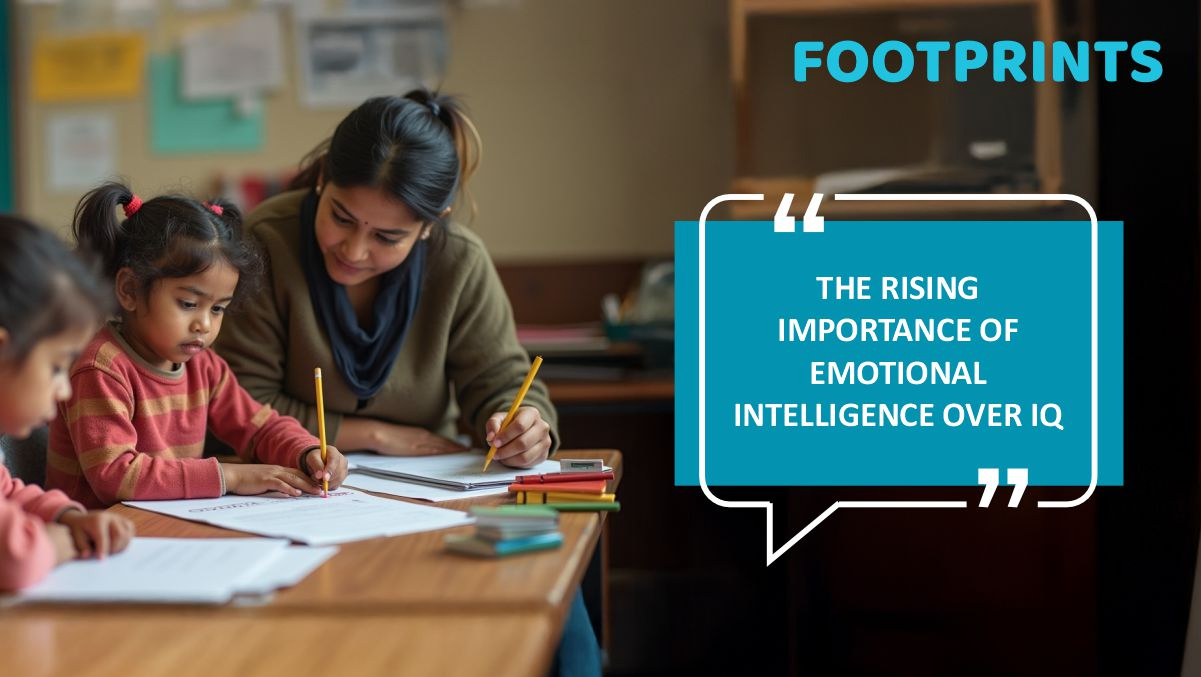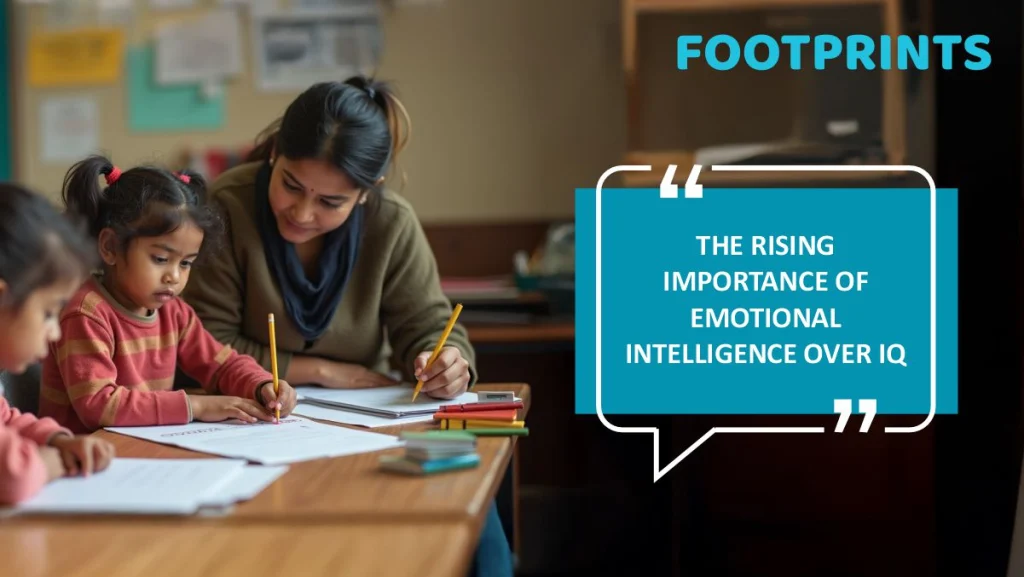

Emotional intelligence (EQ) has emerged as a key factor in both personal and professional contexts. Emotional intelligence tends to help you keep a job and perform well in it, even though a high IQ can still help you land one. From the board room to the playground, we observe that emotional intelligence is becoming at least as important as cognitive intelligence.
As our workplaces become more collaborative and emotional, the difference between IQ and EQ is becoming increasingly prominent. These days, there is an increasing emphasis on IQ and EQ in relation to childhood development. This article examines why emotional intelligence is becoming more and more important and what that means for relationships and leadership in general.
EQ vs IQ: Which is of greater importance today?
IQ has always been the golden standard for measuring cognitive skills which include logical reasoning, memory, and problem solving. Also it is a number that indicates academic success and intellectual promise. Emotional quotient on the contrary is the ability to identify, interpret, and manage emotions in oneself and the emotions of others.
So the question isn’t really a comparison of emotional quotient vs intelligence quotient and prioritizing one over the other. Instead, we explore how they function together, playing to each other’s strength and creating more intelligent and emotionally conscious individuals. The world today demands people centred EQ and IQ instead of just IQ scores alone.
EQ is growing in importance over IQ
- Better Communication: Individuals with high emotional intelligence are able to put themselves in others’ shoes and respond with empathy which in turn forms stronger connections.
- Stronger Leadership: Great leaders act with empathy, patience, and emotional control, which reflects of a high EQ.
- Improved Teamwork: EQ helps in improving team harmony by avoiding misunderstandings and quickly resolving conflicts.
- Greater Mental Health: Those which can identify and handle their emotions do better with stress and anxiety.
IQ may help with logical analysis of problems, but EQ is what helps in the complex and ever-changing world of human interactions. The development of emotional intelligence is the understanding of empathy, patience and stronger self-control when while interacting with the world outside.
The IQ and EQ Difference:
Understanding the difference between IQ and EQ is important for parents, teachers and professionals for an overall balanced growth of the person. To break it down:
Mental IQ Emotional Quotient:
Focus on Logical thinking, memory, analysis, Emotional intelligence, empathy, self-regulation.
Measure Test scores, behaviours, emotional reactions:
These help us see improvement in academic performance and in forming connections, management of emotions.
Development: While it is true that improvement becomes difficult as we age, but with focus and discipline, development and growth can be fostered and improved upon at any age.
This is why we are seeing a greater distinction between IQ and EQ which in turn is causing education systems and workplaces to shift towards a more emotional intelligence based approach.

Ways to Improve Emotional Intelligence in Your Day to Day Life:
Improving EQ doesn’t require one to break a bank for expensive courses. It is about adopting small consistent habits which in turn will enhance your emotional awareness and empathy.
1. Practicing Active Listening:
Instead of immediate response, wait to understand. Break, think it over, then reply thoughtfully.
2. Develop Empathy:
Put in other’s point of view in the middle of a dispute. This may reduce tension and increase trust.
3. Name out your feelings:
When you are frustrated, happy, or anxious, speaking up and naming-out feelings helps in their management.
4. Think Before Acting:
Not everything has to be an instant reaction. Take a breath before you react in tough situations.
5. Stay a student of your feedback:
Emotional intelligence plays a role in how we receive feedback. We see that emotionally intelligent people use feedback as a tool for growth instead of perceiving it as a personal attack.
FAQs on Emotional Intelligence
· What does emotional quotient mean in simple terms?
EQ is a measure of how well a person recognizes, understands, and manage their own emotions and that of others.
· Can EQ be taught during childhood?
Absolutely. In early years emotional growth is very important. We teach children to identify their feelings and to respond with kindness which in turn forms the base of their EQ.
· Is IQ more relevant than EQ in academics?
IQ is obviously more relevant when it concerns academics, but EQ supports it by way of better motivation, focus, and social interaction in the learning environment.
How do I test my EQ?
There are a number of self-assessment tools online. Also at times it is in the growth from honest self-reflection and input from others.
Why are schools emphasizing EQ now?
In the realm of better classroom behaviour, improved learning, and healthier social interaction we see the value in emotional intelligence which is key to future success.

Key Takeaways
IQ is a measure of brainpower; EQ is that of emotional strength.
EQ is very easy to develop as opposed to IQ.
Emotional intelligence: From mental health to leadership success, all that we do is affected by it.
Start developing EQ at a young age for life time benefits.
FAQs
Q: Which is more important, EQ or IQ?
A: Both are equally important, but EQ is what really makes the difference in the real world, with its application to team dynamics, conflict resolution, and leadership.
Q: Can you increase emotional intelligence over time?
A: Yes. Unlike IQ which is a given, EQ is a skill which you develop through mindfulness, reflection and practice.
Q: What do you note as the difference between emotional and intellectual intelligence?
A: Emotional quotient in terms of feelings and relationships, at the same time Intelligence quotient in terms of logic and info.
Q: Is it in our genes or is it something we learn?
A: In some cases people are born with a knack for it, but most emotional skills are a result of learning and conscious development.
Conclusion
Emotional intelligence is a fact not a fad, it is a life skill. While IQ may get you through the door, EQ is what builds lasting relationships, fuels great leadership, and promotes personal growth. As our world becomes more tied together and emotion becomes a more complex factor in each of our lives, developing a high emotional quotient is not a choice – it is a requirement.
It is a foundation which develops greater resilience, compassion and capacity in people. From a young age we see the impact of EQ which also transforms personal results and the community we create together.
As significant as early identification of emotional intelligence is, the choice of the right learning environment is equally important for parents. At Footprints Play School we put emotional learning into the fabric of what we do every day. We create the base for full development which is at once cognitive and emotional.
Aditya brings over ten years of expertise as a Senior Marketing Strategist. He’s an expert at developing captivating marketing tactics that regularly provide excellent outcomes. His innovative strategies have demonstrated a track record of increasing organizational reach and engagement, showcasing his extensive knowledge of the contemporary marketing landscape.

